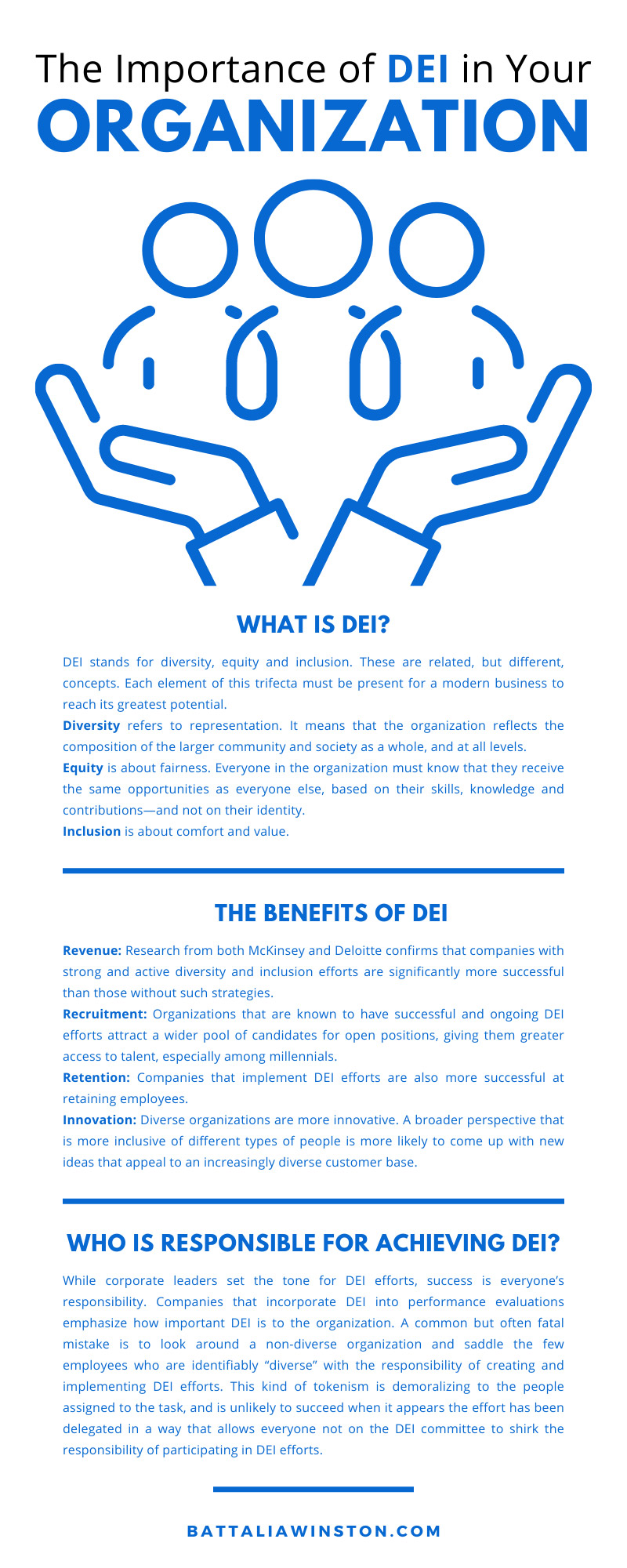.
There are trends in business that represent long overdue, positive and permanent change. Diversity, equity and inclusion (“DEI”) is one such area.
Business leadership has a strong influence over corporate culture, and a responsibility to create a culture that fosters business success—and yes, builds shareholder value. Numerous studies have proven that organizations with a genuine and ongoing commitment to DEI are more successful than those who make only token efforts, or worse, no efforts at all.
The importance of DEI in your organization can be measured in many ways, but for CEOs answerable to their boards for quarterly results, the bottom line may be the starkest measure of all. If a company lags in DEI, it will lag in competitiveness.
Understanding that DEI isn’t a catchphrase, a trend, or a fad is critical to launching and maintaining a successful DEI program within an organization. The first step is to gain an understanding of what DEI is, and what each of the terms represented in the acronym mean.
What Is DEI?
As noted above, DEI stands for diversity, equity and inclusion. These are related, but different, concepts. Each element of this trifecta must be present for a modern business to reach its greatest potential.
Diversity refers to representation. It means that the organization reflects the composition of the larger community and society as a whole, and at all levels. Persons of different races, genders (including sexual orientations), ethnic backgrounds and national origins, ages and physical and intellectual abilities are present in the organization.
Equity is about fairness. Everyone in the organization must know that they receive the same opportunities as everyone else, based on their skills, knowledge and contributions—and not on their identity. Studies have shown how hiring managers treat candidates with identical qualifications differently based on things like sex and perceived race or national origin. Between a male and female candidate with comparable resumes, hiring managers more often not only prefer the male candidate, but also tend to offer a higher salary.
Other studies have shown that a candidate’s name can influence decisions about whether to interview or hire them. Candidates with names that seem to correspond with underrepresented groups are more often passed over in favor of candidates with Dick-and-Jane types of names. A genuine DEI effort recognizes the dangers of both over and unconscious bias and works hard to address those dangers.
Inclusion is about comfort and value. It’s not enough to simply have a percentage of your workforce that can be identified as “diverse.” Inclusion requires that all persons in the organization are valued, and that the organization actively seeks and gives weight to the different perspectives and contributions available from a diverse workforce.
Inclusion also requires vertical diversity, meaning that an organization composed of 50% “diverse” employees, but only 2% diverse managers, is failing at DEI efforts.
Achieving a balance of diversity, equity and inclusion requires an authentic and ongoing commitment, as well as committed leadership that understands the importance of DEI to the organization.
The Benefits of DEI
- Revenue: Research from both McKinsey and Deloitte confirms that companies with strong and active diversity and inclusion efforts are significantly more successful than those without such strategies. Companies with effective DEI programs have a 35% greater chance of exceeding their average returns, and a 31% increase in overall business performance.
- Recruitment: Organizations that are known to have successful and ongoing DEI efforts attract a wider pool of candidates for open positions, giving them greater access to talent, especially among millennials. Generation Z, the children of millennials, are the most diverse generation in US history and are likely to push not just for diversity, but also for racial justice, according to Forbes. And with the remote work revolution, companies now have a truly global candidate pool from which to select the most qualified and creative candidates.
- Retention: Companies that implement DEI efforts are also more successful at retaining employees. Workers who feel heard, seen and valued are happier and more engaged, and less likely to jump ship to a more welcoming organization.
- Innovation: Diverse organizations are more innovative. A broader perspective that is more inclusive of different types of people is more likely to come up with new ideas that appeal to an increasingly diverse customer base.
Who Is Responsible for Achieving DEI?
While corporate leaders set the tone for DEI efforts, success is everyone’s responsibility. Companies that incorporate DEI into performance evaluations emphasize how important DEI is to the organization.
A common but often fatal mistake is to look around a non-diverse organization and saddle the few employees who are identifiably “diverse” with the responsibility of creating and implementing DEI efforts. This kind of tokenism is demoralizing to the people assigned to the task, and is unlikely to succeed when it appears the effort has been delegated in a way that allows everyone not on the DEI committee to shirk the responsibility of participating in DEI efforts.
Forward-thinking companies with their eye on the bottom line know that DEI is too important a function to “set and forget.” The first step in assuming the necessary level of responsibility for DEI in an organization is for leadership to demonstrate their commitment and require participation across the organization.
As Deloitte’s research shows, leadership matters—and middle managers matter a lot. The “bread” on the top and bottom of the DEI sandwich may be fully on board, but if the “filling” in the middle isn’t committed, or doesn’t understand how to participate, the effort will undoubtedly fail.
Whether your company is launching or trying to jump-start DEI efforts, working with a professional diversity and inclusion executive search firm can help. These professionals can help identify and recruit an exceptional pool of candidates to lead ongoing DEI efforts that keep everyone in your organization involved and engaged. Contact Battalia Winston when you need to fill a DEI leadership position or recruit a diverse pool of candidates for other critical management roles across your business.



